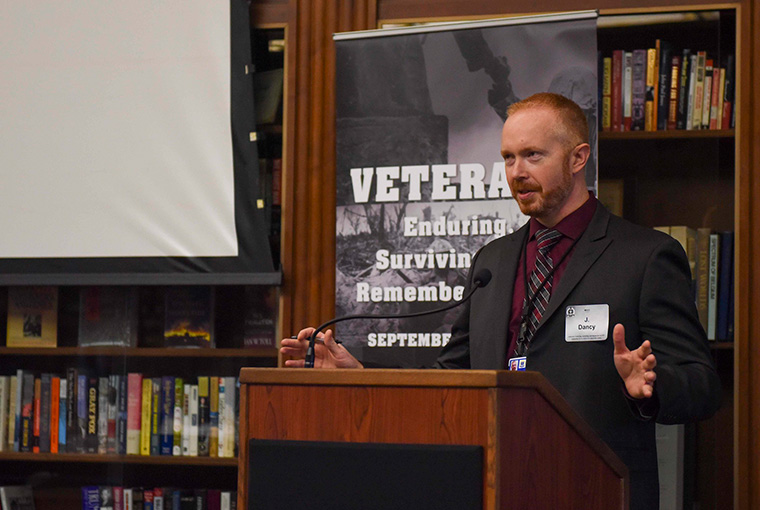As Study of Veterans Gains Ground in Academia, U.S. Naval War College Looks at the Aftermath of War

NEWPORT, R.I. -- U.S. Naval War College hosted a conference Sept. 11-13 focused on military veterans, gathering more than 40 scholars to examine the experience of war, homecoming and what it has meant to be a veteran in the United States and elsewhere.
The conference, called “Veterans: Enduring, Surviving and Remembering War,” was organized by assistant professor J. Ross Dancy, who teaches in the Naval War College’s John B. Hattendorf Center for Maritime Historical Research.
“There’s a big gap between the civilian and military worlds, and veterans bridge that gap,” said Dancy, a Marine Corps veteran whose scholarly work has focused on military manpower.
“Understanding veterans is a great way to understand the divide that separates us,” said Dancy, in an interview, noting that the high rates of suicide and homelessness among veterans underscore that reintegrating this population continues to be a challenge for policymakers.
Other scholars described veterans studies as an emerging academic subspecialty, driven in part by the recent experiences of the nearly 5 million Americans who have served during the post-9/11 conflicts.
“Veterans studies is a burgeoning field,” said Matthew Becker of the University of Massachusetts Press, which is poised to publish a book series examining the post-war lives of veterans.
“I talked to several people who said that by starting this series you are doing what disability studies did maybe 20 years ago,” Becker told the assembled scholars, who he invited to contribute. “You are right on the cusp of helping define this study.”
The conference looked at the veteran experience from many angles, such as veterans in the political arena, how veterans are portrayed in literature and the common experience of returning home from war as a changed person.
Keith Altavilla, assistant professor at Lonestar College-CyFair in Texas, noted that the way veterans have been characterized and viewed has changed over political eras.
After the Vietnam War, in one example, the Democratic Party began to associate veterans with disenfranchised sectors of the population, he said.
“Now veterans’ concerns are mixed with what we would call ‘identity groups,’” Altavilla said of that time period. “This does not lessen statements of support for veterans. But it suggests a need to differentiate who veterans are, that they fit in a category with women and African Americans and other groups who had been somehow traditionally left out of society.”
Ohio State University’s Bruno Cabanes noted that many famous storytellers – from Homer to Scorsese – have sketched a similar picture: the returning veteran as vagabond and voyager.
“Most people in this room will recognize the reality that characterizes most veterans in the modern era,” Cabanes said.
“Veterans are men, and now women, in transition. Veterans have experienced a major change in their social identity – from wartime to peacetime ... from a social status of living with their brothers in arms to a status of outsiders in post-war societies.”
Jonathan Shay, a psychiatrist whose career has been dedicating to helping and studying veterans, spoke about his 20 years of work with psychologically injured combat veterans.
“I quickly learned that what took the greatest toll on their lives, their families, their workplaces and communities was traumatic damage to good character,” Shay told his audience.
“Many of the veterans we worked with had been incarcerated. Many had lived violent lives since their return to civilian life. Their own violence had blighted their lives,” Shay said.
“Ultimately, I came to know that most of these men hated their own bad behavior and suffered great humiliation when they contemplated it and the damage it had rained down on their families and themselves.”
Dancy said after the event that he and other organizers hope the conference spurs more scholarship and publishing in the field of veterans studies.
For U.S. Naval War College photos of the event: https://flic.kr/s/aHsmGVrXZp
To watch keynote addresses: https://youtu.be/_jPvlv4Ckl0
